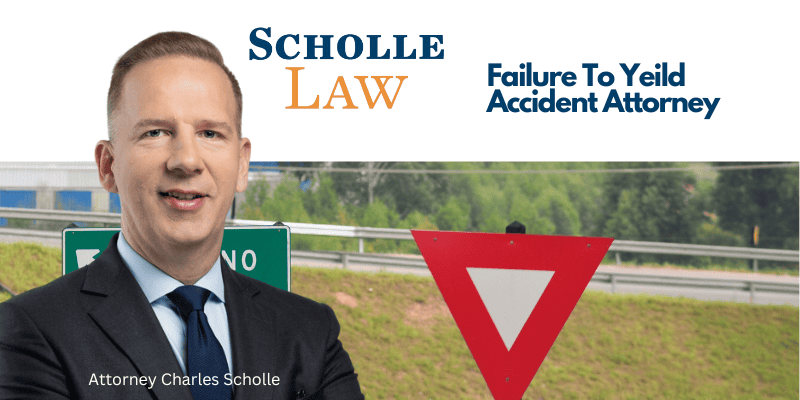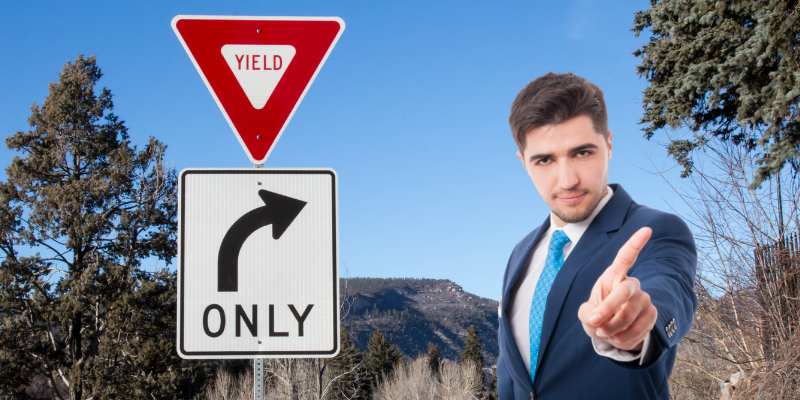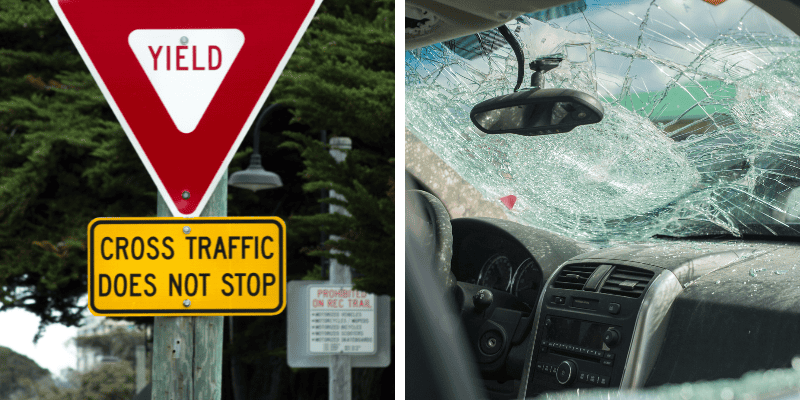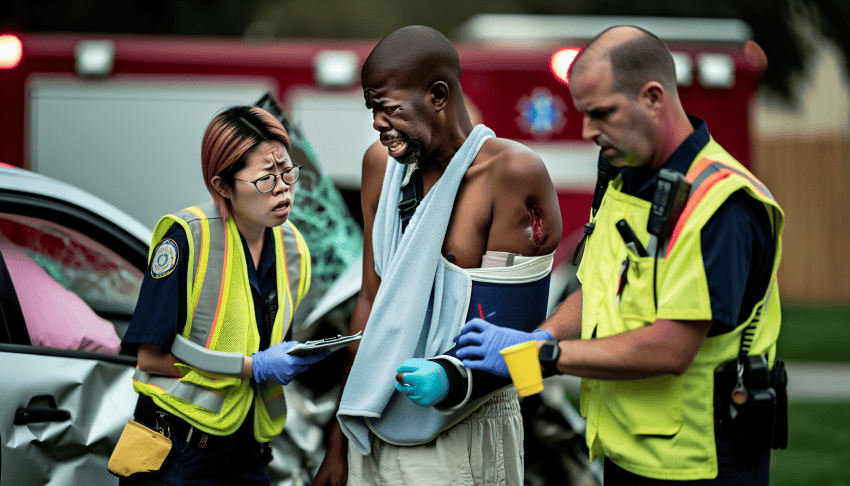4.9 Rating
Google REVIEWS
Leaders in Georgia Personal Injury Law Since 1995
Top Failure to Yield Accident Attorney: Navigating Your Legal Rights After an Intersection Mishap
Dealing with the aftermath of a failure to yield accident can be overwhelming, and you may wonder where to turn for legal help. A knowledgeable failure to yield accident attorney is pivotal in ensuring your rights are protected and you receive just compensation. This article breaks down the intricacies of such accidents and arms you with information to make informed decisions about your legal needs.

Key Takeaways
- Failure to yield accidents are legally significant and may result in liability for the driver failing to give right of way, necessitating a clear understanding of traffic laws and legal counsel to navigate potential repercussions.
- Precise documentation, including police reports, witness statements, and evidence from the scene, is crucial to establishing fault and liability in a failure to yield accident, which can subsequently inform the legal strategy for pursuing compensation.
- A specialized car accident attorney can offer invaluable guidance in proving fault, handling insurance claims, and advocating for fair compensation for injuries and losses incurred as a result of a failure to yield accident.

Understanding Failure to Yield Accidents and Legal Implications
A driver’s failure to yield can lead to severe consequences, ranging from devastating injuries to significant financial losses. Common examples of failure to yield include not stopping at stop signs, ignoring yield signs when entering highways, and turning left in front of oncoming traffic. These scenarios make it crucial for drivers to understand traffic laws and uphold their duty to yield the right of way.
Failure to yield accidents can result in legal liability for the driver who failed to give the right of way. This highlights the importance of seeking advice from a yield accident lawyer who can help navigate the legal complexities that arise from such incidents. Additionally, even drivers with the right of way must remember to exercise caution to prevent accidents, as negligence can also lead to legal repercussions.
Defining Failure to Yield in Traffic Law
Failure to yield occurs when one driver impedes the right of another driver or pedestrian who legally has the priority to proceed first in a given road scenario. At intersections, right-of-way rules require drivers to yield to those already present or approaching from the right, to pedestrians in crosswalks, and to drivers with a green light or who are executing a legal turn.
Complex road configurations like multi-lane roundabouts increase the potential for failure to yield incidents, demanding heightened caution and clear understanding of lane positions and yielding protocols. Common situations leading to failure to yield accidents include navigating two-way stops, T-shaped intersections, and situations with unclear right-of-way indication.
The Role of Police Reports as Evidence
As an accident victim, you might be wondering, “How can I prove the other driver’s failure to yield?” This is where the role of police reports as evidence comes into play. Calling the police after a failure to yield accident is crucial as they prepare an objective report that becomes an important piece of evidence in any legal claim.
Police reports encapsulate critical details such as the date, time, location of the accident, statements from those involved, and any citations issued which are essential for legal proceedings. Police officers evaluate the accident scene to determine which driver failed to yield and typically issue a ticket to the at-fault party, further aiding in establishing fault in the police report.
Besides the police report, fault may also be established through:
- Witness statements
- Photos or videos of the crash
- Surveys of the accident scene
- Accident reconstruction
- Documentation of damage to the vehicles involved.
Identifying the Duty to Yield: When and Where It Applies
Traffic laws governing the duty to yield are designed to facilitate smooth and safe traffic flow. The City of Atlanta, along with the entire state of Georgia, specifies multiple instances where drivers are required to yield the right of way. Knowing when and where to yield the right of way is integral to preventing failures to yield and their subsequent accidents.
Georgia law mandates drivers to yield in the following situations:
- At intersections when facing a stop sign or stoplight, with cross traffic not having a stop sign
- In uncontrolled intersections, offering the right-of-way to the driver on the right
- When making a left turn, yielding to all oncoming traffic
- When approaching a yield sign, ensuring the path is clear before proceeding.
Special yielding rules apply for highway maintenance vehicles and workers in construction zones, as well as to pedestrians at crosswalks. Hence, it is crucial for drivers to stay vigilant, particularly in heavily urban areas.

Yielding at Intersections and Traffic Signals
Intersections and traffic signals can be a major hotspot for failure to yield accidents. When traffic lights are present, drivers are responsible for ensuring the intersection is clear of traffic before proceeding, even when faced with a green light. This is especially important as many instances of failure to yield accidents occur when a driver proceeds into the intersection without adequately checking for oncoming traffic.
At a four-way stop, drivers must yield to the vehicle on their right if both vehicles arrive at the intersection simultaneously. In roundabouts, drivers must yield to traffic already inside the roundabout, which arrives from their left, before entering. Drivers may enter a roundabout when there is no traffic inside it, or if there is an adequate gap to merge safely.
Furthermore, drivers are legally required to yield the right-of-way to emergency vehicles by moving to the road’s shoulder or, if that’s not possible, by moving as far right as possible and stopping their vehicle.
Merging and Changing Lanes: Knowing When to Yield
Merging or changing lanes also involves a duty to yield. When merging into traffic, drivers must be mindful of the existing traffic flow and adjust their speed and vehicle position accordingly. In Georgia, drivers merging into traffic must yield to oncoming vehicles already in the lane.
Moreover, if a vehicle is attempting to merge, drivers in the current lane should, if safe, move over or adjust their speed to facilitate a smooth and safe merge. By understanding these rules and acting accordingly, drivers can significantly reduce the risk of failure to yield accidents.

Consequences of Failing to Yield: Injuries and Losses
The ramifications of failing to yield can be far-reaching, often resulting in serious and sometimes catastrophic injuries to those involved. Injuries from such accidents vary widely from minor to severe, including traumatic brain injuries and neck injuries, and can impact drivers, passengers, pedestrians, and bicyclists.
Beyond physical injuries, victims often face significant financial losses such as escalating medical bills and lost income due to inability to work. With these potential consequences, it is crucial for individuals involved in these accidents to seek immediate medical attention and keep detailed records of medical treatments to effectively link their injuries to the accident for legal claims.
Types of Recoverable Damages
Recovering from a failure to yield accident goes beyond healing from physical injuries. Victims often face financial burdens that can be overwhelming. However, victims injured in such accidents can seek restitution for damages including medical bills, lost wages, and compensation for pain and suffering.
Further financial restitution may cover disability, punitive damages, and if applicable, a wrongful death claim. Objective evaluation of the claim must take into account all relevant factors, including medical expenses, property damage, lost wages, and the victim’s pain, to determine fair financial compensation. Lawyers assist in gathering necessary medical records and documented proof of incurred expenses to legitimize claims of financial, physical, and emotional harm.
Therefore, it’s crucial for individuals involved in a traffic accident to keep detailed records of all related expenses, such as repair costs and medical bills, to ensure all damages can be accounted for in the claim. In some instances, a spouse may file a loss of consortium claim when the accident adversely affects the marital relationship.
Seeking Justice with a Yield Accident Lawyer
After a failure to yield accident, victims may find themselves in a whirlwind of medical, financial, and legal challenges. Hiring a yield accident lawyer such as Scholle Law, enables individuals to focus on their recovery, knowing that an expert is handling complex legal processes and settlement negotiations. In the unfortunate event of a yield accident lawyer failure, it is crucial to seek a more experienced yield accident lawyer who can conduct a thorough investigation of the incident, gathering necessary evidence to determine causation and establish fault.
A specialized attorney advocates for clients to secure compensation for a wide array of damages, including:
- Medical costs
- Lost income
- Pain and suffering
- Emotional trauma
Having a legal advocate by your side can significantly ease the recovery process by ensuring that your legal rights are protected and that you receive the compensation you deserve for your losses.

Why Choose an Experienced Car Accident Attorney
When it comes to seeking justice after a failure to yield accident, choosing the right legal representation is essential. Here are some reasons why you should work with a law firm that focuses solely on Personal Injury cases:
- Expert representation and guidance in your case
- In-depth knowledge and experience in auto accident law
- Ability to successfully navigate your case and fight for your rights
Law firms that represent “all types of cases” might not have enough auto accident law knowledge or experience to provide you with the best possible outcome.
Choosing an experienced car accident attorney ensures that your case will be handled with the utmost care and expertise. With their extensive knowledge of traffic laws and experience dealing with insurance companies, these attorneys can provide invaluable assistance in securing fair compensation for your losses.
Strategies for Proving Fault and Liability
Proving fault in a failure to yield accident can be a complex process. However, with the right strategies and a skilled attorney by your side, it is possible to establish fault and liability. These strategies include searching for video footage, analyzing roadway cameras, and compiling police reports and witness testimonials.
An attorney’s assessment may consist of:
- determining whether the victim bore any fault
- preparing and sending a demand letter that instigates the at-fault driver’s insurance company to investigate and determine fault and case value
- countering the accident report findings with additional witnesses and video evidence if a driver is incorrectly found at fault.
Identifying liable parties includes establishing the person who failed to yield as responsible for damages and may also involve invoking vicarious liability laws to hold employers accountable for their employees’ actions. If litigation is necessary, specialized car accident attorneys will advocate on behalf of their clients in court.

Steps to Take After a Yield Accident: Legal Advice
In the aftermath of a yield accident, knowing the next steps to take can be overwhelming. Seeking a free consultation with a yield accident lawyer can help in handling insurance claims and assist with any necessary legal action. Before talking further with another party’s insurance company, it is advisable to speak with legal counsel.
Prompt notification to insurance companies should occur immediately after an accident to initiate the claims process. Keep in mind that personal injury lawsuit victims in Texas must file a lawsuit within two years to seek compensation. By arming yourself with the right legal advice, you can navigate the post-accident process with confidence and peace of mind.
Documenting the Accident and Injuries
Documenting the accident and your injuries is an essential step in the aftermath of a yield accident. This includes:
- Taking photographs of the accident scene from multiple angles
- Capturing the vehicles involved, property damage, skid marks, traffic signs, road conditions, and visible injuries
- Collecting witness statements at the scene, noting detailed accounts of the incident and obtaining their names and contact information for future reference.
Maintaining a detailed accident journal can help document the aftermath of the accident, including pain levels, emotional distress, missed workdays, and financial losses. Additionally, it is advisable to keep a record of any interactions with the other driver, including their name, contact information, insurance details, and vehicle registration number.
Proper documentation is critical in supporting your claim and securing fair compensation for your losses.
Navigating Insurance Claims and Settlements
Navigating insurance claims and settlements after a yield accident can be a challenging process. Insurance companies often rely on the statements of their insured to deny liability and avoid paying damages. Yield accident lawyers are skilled in dealing with insurance companies by assessing claim value and managing communications and settlement offers.
Car accident lawyers are adept at negotiating with insurance companies to ensure that their clients receive compensation reflecting the full extent of their damages. Victims of yield accidents should not settle with insurance companies without first consulting with a knowledgeable accidents lawyer to ensure fair compensation. Remember, your right to fair compensation is paramount and should not be compromised.
Summary
Navigating the aftermath of a failure to yield accident can be a daunting process. From understanding traffic laws and identifying the duty to yield, to dealing with insurance claims and seeking legal representation, the journey is laden with complexities. However, with the right knowledge and guidance, victims can successfully navigate this process and secure just compensation for their losses.
This guide has sought to provide valuable insights into the intricacies of failure to yield accidents and their legal implications. Armed with this knowledge, victims can better understand their rights, make informed decisions, and ultimately, seek justice for their losses. Remember, you have the right to fair compensation, and with an experienced yield accident lawyer by your side, you can confidently pursue the justice you deserve.
Frequently Asked Questions
What constitutes a failure to yield in traffic law?
A failure to yield happens when a driver obstructs the right of way of another driver or pedestrian, who legally has the priority to proceed first in a specific road situation.
What role do police reports play in failure to yield accidents?
Police reports play a crucial role in failure to yield accidents by capturing important details such as the date, time, location of the accident, statements from those involved, and any citations issued. It is important evidence for insurance claims and legal proceedings.
What are the consequences of failing to yield?
Failing to yield can lead to serious injuries and financial losses, including medical bills and lost income. Be mindful of yielding to prevent such consequences.
How can a yield accident lawyer assist me?
A yield accident lawyer can assist you by handling legal processes, negotiations, and investigations, and advocating for compensation for your damages.
What steps should I take after a yield accident?
After a yield accident, seek medical attention, document the accident and injuries, notify your insurance company, and consider seeking legal advice from a yield accident lawyer. It’s important to take these steps promptly to ensure your well-being and protect your legal rights.
